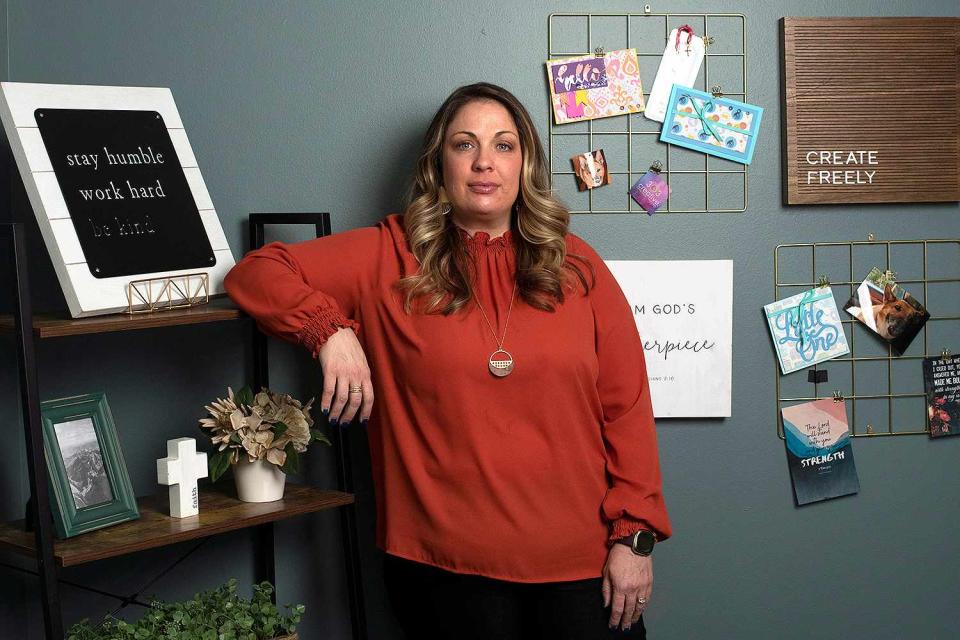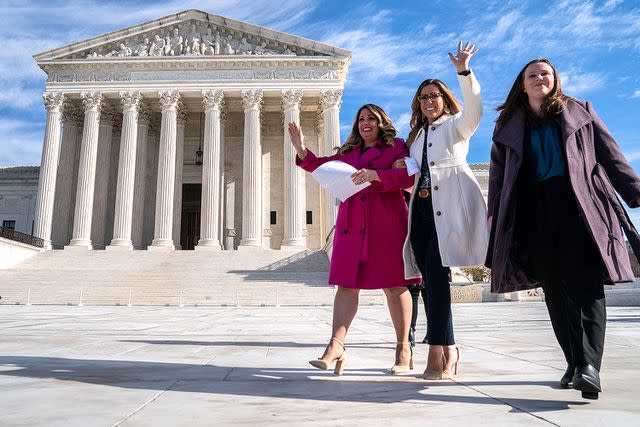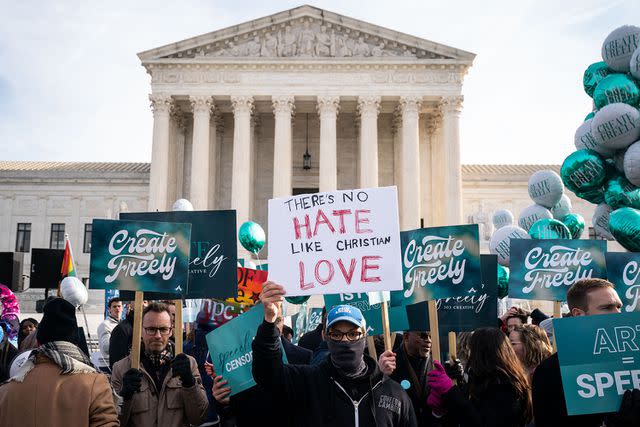The Bizarre — and Hypothetical — Case That Sparked the Supreme Court's Regressive LGBTQ+ Discrimination Ruling
On Friday, the Supreme Court sided 6-3 with a Christian web designer who sought permission to refuse her creative services to LGBTQ+ people. The designer's case began in 2016 with a hypothetical question

Rachel Woolf for The Washington Post via Getty Images
Lorie Smith, the Christian web designer who sparked a landmark Supreme Court decisionOn Friday, the Supreme Court ruled 6-3 to allow a Christian web designer to refuse her services to LGBTQ+ people, a historic decision that walks back hard-fought human rights battles and paves the way for businesses to legally discriminate based on a person's sexual orientation or gender identity.
The case that spawned the decision, 303 Creative LLC v. Elenis, was brought by Lorie Smith, a website designer who owns 303 Creative and wanted to challenge a Colorado law prohibiting businesses from discriminating against LGBTQ+ customers.
And while Smith's case echoes the 2018 Masterpiece Cakeshop v. Colorado Civil Rights Commission case — in which the Supreme Court sided 7-2 with a baker who refused to make a wedding cake for a gay couple — the web designer's argument was at first merely hypothetical, in that she didn't actually have any would-be customers who are gay.
Here's more about Smith, and what made the precedent-setting case so unique.

Kent Nishimura / Los Angeles Times via Getty Images
Lorie Smith, a Christian graphic artist and website designer in Colorado (left), prepares to speak to supporters outside the Supreme CourtSmith's Case Was Hypothetical
Smith's lawsuit was built largely around a hypothetical scenario, in that she had not actually designed any wedding websites or tried to turn away same-sex couples when she sued.
Still, Smith filed suit in Colorado in an attempt to block the enforcement of its anti-discrimination law, arguing that when she does begin designing wedding websites, she should not be forced to design them for LGBTQ+ clients, because creating messaging that she disapproves of would oppose her religious beliefs and potentially violate her right to free speech.
Smith brought the case to the U.S. District Court in Colorado in 2016, represented by the conservative legal group Alliance Defending Freedom. Because she had not yet been confronted with a gay couple requesting her services — or broken the anti-discrimination law — the state sought to dismiss her case.
Months later, Smith's legal team said that she had, in fact, received an inquiry to design a gay couple's wedding website after the suit was filed. Smith submitted a sworn statement about the inquiry, along with a copy of the "same-sex wedding request," as evidence.
She still lost the case. And the appeal. Then the Supreme Court agreed to hear her out.
The Gay Couple Cited as an Example in Smith's Case Reportedly Did Not Exist
Included in filings for the 303 Creative case is an alleged request that came from a man seeking help with a gay wedding website. But as The New Republic reported on Thursday, the man identified in the request says he never filed it.
The New Republic cites court filings from Smith showing that a man named Stewart contacted her in September 2016 about his wedding to Mike, which he said was taking place “early next year.” He added that the couple “would love some design work done for our invites, placenames etc. We might also stretch to a website.”
But this week — when The New Republic got ahold of the Stewart whose name, email address, and cell phone number were included on that "same-sex marriage request" — the man told the outlet he did not send the form, and that he was married to a woman at the time it was allegedly sent.
“If somebody’s pulled my information, as some kind of supporting information or documentation, somebody’s falsified that,” Stewart told the outlet. “I’m married, I have a child — I’m not really sure where that came from? But somebody’s using false information in a Supreme Court filing document."
As The New Republic notes, it's unclear whether the inquiry from “Stewart” included in the initial court filing was ever verified.

Kent Nishimura / Los Angeles Times via Getty Images
Protesters stand outside the Supreme Court in December 2022 during oral arguments in the case of '303 Creative LLC v. Elenis'Smith Was Represented by a Christian Legal Group Known to Target LGBTQ+ Rights
Smith has been represented by attorneys for the Christian rights group Alliance Defending Freedom (ADF), which lobbies to expand Christian practices within public schools and in government, and to outlaw abortion.
As The Guardian reports, the group has spent millions of dollars in an attempt to curtail LGBTQ+ rights, and has been involved in many cases across the U.S. that deal directly with transgender rights. The group was also tangentially involved in a series of "He Gets Us" ads that aired during the Super Bowl and depicted a modern view of Jesus in an apparent attempt to market his teachings to Millennials and Gen Zers.
ADF's attempts to strip rights from the LGBTQ+ community come amid a wave of 2023 bills specifically targeting queer and transgender people.
For more People news, make sure to sign up for our newsletter!
Read the original article on People.

